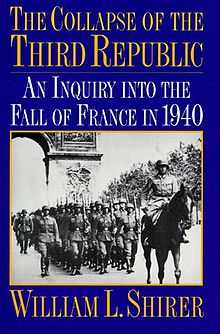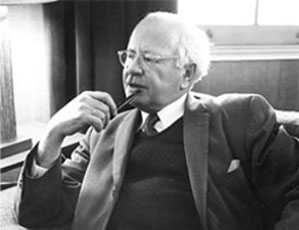The Collapse of the Third Republic
 The Collapse of the Third Republic | |
| Author | William Shirer |
|---|---|
| Country | United States |
| Language | English |
| Genre | History |
| Publisher | Simon and Schuster |
Publication date | 1969 |
The Collapse of the Third Republic: An Inquiry into the Fall of France in 1940 by William L. Shirer (New York: Simon and Schuster, 1969) deals with the collapse of the French Third Republic as a result of Hitler's invasion during World War II.[1]
The buildup to war
As a CBS correspondent in Germany during the climactic event under discussion, and as a frequent visitor to and correspondent from France during the prewar years, Shirer was left to question how Germany had overrun France within weeks in 1940. These two countries had fought each other for four years in 1914-1918, with France successfully resisting Germany at every turn of battle along the Western Front during World War I.
Shirer, who knew the French language, did much of his own research for this 1969 book, talking with surviving politicians and French leaders from the immediate prewar period as well as those who were on duty during the final catastrophe. His conclusion was that France had defeated herself. Unhealed wounds in its civil society, dating back to the Dreyfus Affair of the 1890s, had left France's political Left and Right with unassuageable feelings of resentment towards their opponents.
The Great Depression of the 1930s further inflamed these feelings of bitterness. France's Right, in particular, believed that its country's secular leadership was condemning the country to decadence. A badly divided France tried to avoid war with Adolf Hitler, participating fully in the negotiations at Munich in 1938, but Hitler forced the issue in the following year with his invasion of Poland. World War II had begun.
Collapse
In 1939-1940, the Republic of France faced a united, determined, and technologically sophisticated enemy. It was desperately important for them to match these traits with determination and unity of their own. Instead, French national leaders frittered away their final months before the catastrophe in a round of internal hostility, intrigue, and backbiting leading to the restoration of World War I hero Marshal Philippe Pétain as Premier.
The French media had become thoroughly corrupt. Newspapers, in particular, were bought-and-paid-for mouthpieces of power factionalism.
The German blitzkrieg defeated both the French Army and the French will to fight and resist the invaders. After the Second Armistice at Compiègne, many Frenchmen, especially on the political Right, believed their country had deserved to lose the war. Key leaders and politicians, led by the aging Pétain and the corrupt, power-hungry Pierre Laval, stepped in, proclaiming their devotion to the survival of France within a Hitlerian New Order. Overawing the French parliament, which had fled occupied Paris and was sitting in exile in the resort town of Vichy, they forced their fellow politicians to grant them plenipotentiary powers to control the remainder of unoccupied France for the remainder of the war.
The Third Republic could not survive this disgrace. After the regime of the Pétainist French State and occupation by the Allies, French officials did not restore the former constitution. Instead, they quickly wrote a new Constitution. Its ratification, in October 1946, paved the way for the French Fourth Republic.
References
- ↑ "William L. Shirer, Author, Is Dead at 89". nytimes. New York Times. Retrieved 8 April 2015.
| Wikiquote has quotations related to: The Collapse of the Third Republic |
| ||||||||
